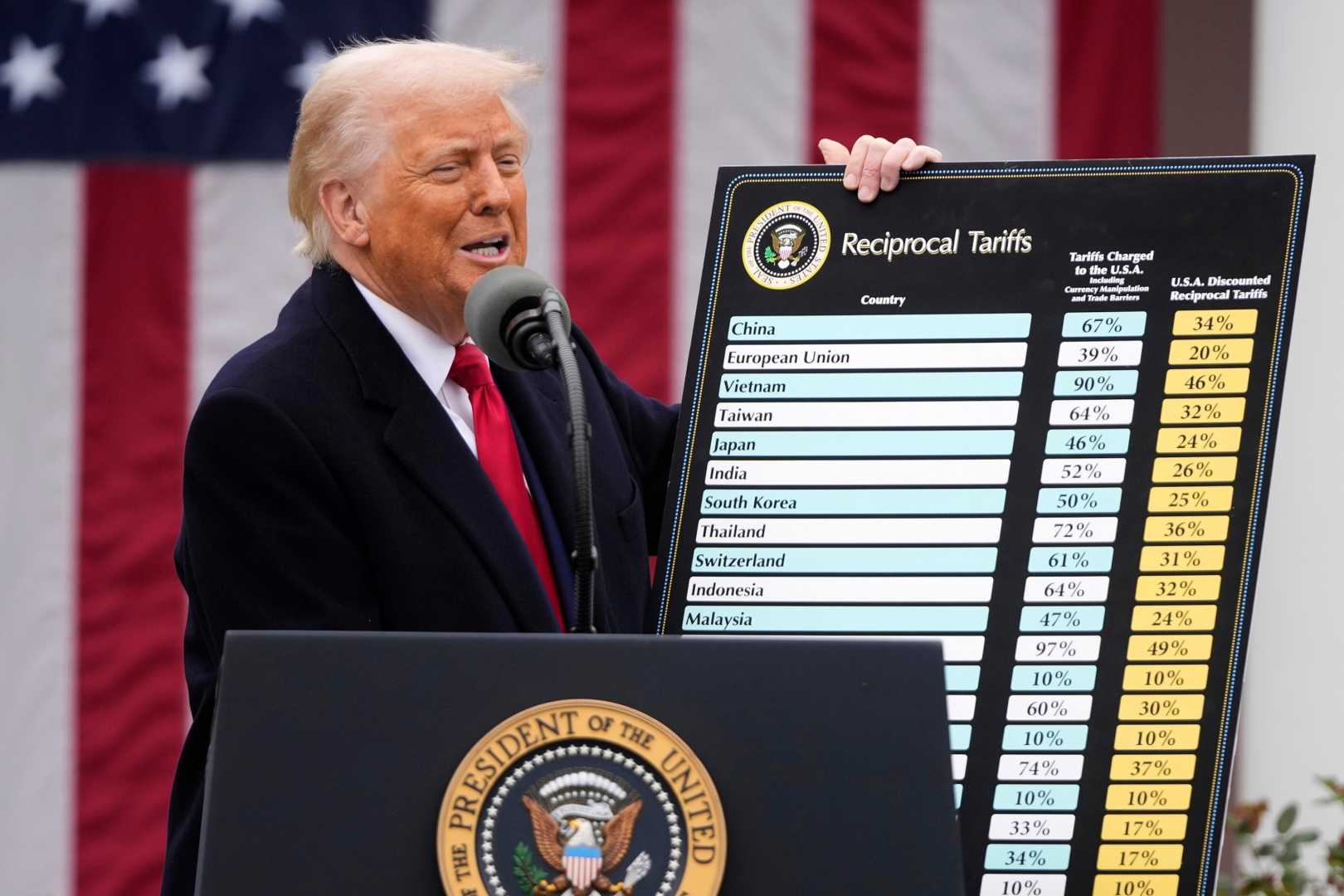Business
Trump Unveils New Tariffs, Stirs Global Trade Tensions

WASHINGTON, D.C. — President Donald Trump announced new tariffs on April 2, 2025, asserting their role in strengthening the United States’ position in international trade relations. This announcement follows Trump’s declaration that negotiations to potentially lower these tariffs will depend on concessions from American trade partners.
“Every country is calling me. That’s the beauty of what we’re doing. We are in control,” Trump told reporters traveling aboard Air Force One on April 3, a day after revealing plans for reciprocal tariffs on over 180 trade partners globally. The initiative has already caused considerable market upheaval and sparked widespread criticism from other nations.
Under Trump’s directive, approximately half of the affected economies will face a baseline tariff of 10%, effective April 5. Larger trade partners will incur higher tariffs, ranging from 15% to nearly 50%, beginning April 9, allowing these countries nearly a week to negotiate with the U.S. government about the potential for reduced tariffs.
When asked whether he would consider negotiations for tariff reductions, Trump responded, “It depends. Taxes will only go down if they give us something really nice.” While the details of what he considers “something nice” remain undisclosed, Trump claimed that the new tariffs provide the U.S. with significant bargaining power.
“In the past, if we asked those countries for help, they would decline. Now they will do whatever we want,” he claimed. This stance contradicts earlier statements from senior advisors like Peter Navarro and Commerce Secretary Howard Lutnick, who suggested that Trump was not aiming for an agreement regarding tariffs. The White House emphasized that U.S. tariffs should not be viewed as a primary negotiation tool.
Market analysts express concern about further declines if Trump does not consider easing the tariffs. “We hope these retaliatory tariffs can be negotiated down and do not lead to a trade war reminiscent of the 1930s,” said Ed Yardeni, an economic expert. “We trust that the art of negotiation will be what drives the President.”
Several administration officials had previously exhibited optimism in the lead-up to this announcement. Treasury Secretary Scott Bessent suggested that negotiations could lead to reciprocal reductions in tariffs. “If you take your tariffs to zero, we will also go to zero,” Bessent mentioned earlier this year.
On April 3, Trump maintained his stance in light of the tumultuous market response to the newly introduced tariffs. He expressed confidence that economic fluctuations would stabilize, stating, “Tariffs give us tremendous strength to negotiate. All countries are calling us.”
When pressed on whether he might consider making concessions, Trump replied that this would depend on the proposals from other nations. He mentioned his willingness to reduce tariffs on China if they agree to divest TikTok’s U.S. operations, indicating an imminent deadline approaching for that deal.
Trump optimistically stated, “We will soon reach an agreement. I believe China will contact us and express dissatisfaction with the tariffs, and they may want to negotiate before accepting the TikTok deal.”
The tariffs, heralded by Trump as a “Liberation Day” for the U.S. economy, signify a significant shift in trade policy. Trump acknowledged the tariffs might cause initial disruptions but maintained they would ultimately strengthen the U.S. economy. He described the fiscal changes as a surgical operation in a post on social media, claiming, “The operation is complete. The patient has survived and is recovering. The patient will be stronger and more prosperous than ever.”
Trump reiterated that any future tariff reductions would hinge upon other nations addressing the trade imbalance with the U.S. “I’ve spent the day discussing ways to lower tariffs,” he noted, having communicated with various world leaders during that time.
According to the World Trade Organization’s Director-General Ngozi Okonjo-Iweala, the U.S. tariff plans could lead to a 1% decline in global merchandise trade this year. Meanwhile, International Monetary Fund Managing Director Kristalina Georgieva characterized the new tariffs as a “significant risk” to the global economy, urging the U.S. to collaborate with its partners to ease trade tensions. Following its January forecast of a 3.3% global economic growth in 2025, the IMF plans to release an updated report later this month ahead of the spring meetings in Washington.












